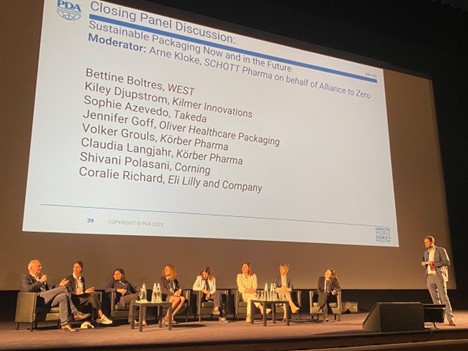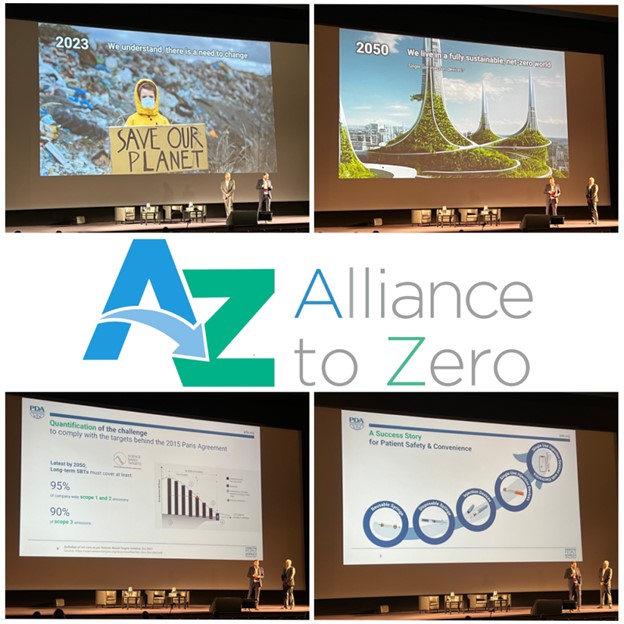Closing the Distance on the Plastics Supply Chain
The immense opportunity to deliver more sustainable therapies to patients without risking patient safety or sacrificing the patient or provider experience was certainly clear at the 2023 PDA Parenteral Packaging Conference held in Venice, Italy, April 18-19. Realizing these ambitions requires the dedicated value-chain collaboration that was on display throughout the meeting.
Sustainability in Sterile Packaging
Jenn Goff (Oliver Healthcare Packaging) and I had the privilege of presenting on how the pharmaceutical industry can contribute to the circular economy and help close the loop on plastics manufacturing. We showed how the industry needs to challenge conventional wisdom when it comes to the acceptability of recycled content for sterile packaging.
 The closing panel discussion addressing what had been covered through the conference
The closing panel discussion addressing what had been covered through the conference
Advanced recycling technologies offer the ability to unlock an above-ground feedstock source, divert difficult-to-recycle plastics from landfills and create new plastic packaging with recycled content that is chemically and physically identical to packaging made with virgin fossil feedstocks. As materials powered by advanced recycling enter the market, we are working to develop and socialize foundational knowledge around advanced recycling throughout the value chain, establish common frameworks and terminology, achieve industry consensus on acceptance and build a business case for adopting certified circular materials for sterile packaging.
Panel moderator Arne Kloke, PhD (SCHOTT Pharma), and Fritz Major (Harro Höfliger) set the tone for the sustainability theme with their joint presentation on behalf of Alliance to Zero. Alliance to Zero is a nonprofit membership association for pharmaceutical and biotech supply-chain companies that aims to facilitate the industry’s transition to compliance with net-zero emissions. Kloke and Major informed the audience about the progress Alliance to Zero is making toward developing a roadmap for the pharmaceutical industry to realize net-zero objectives.
Reaching Net Zero
 Panelists present how the industry can perform more sustainably
Panelists present how the industry can perform more sustainably
Sophie Azevedo (Takeda) emphasized that net zero is not possible without supply-chain collaboration. Scope 3 emissions account for over 80% of greenhouse gas emissions from pharmaceutical companies. Azevedo highlighted that packaging accounts for nearly 10% of Takeda's Scope 3 emissions. She closed her presentation with three calls to action for upstream supply chain partners:
- Develop a greenhouse gas inventory
- Set science-based targets
- Respond to Scope 3 questionnaires and surveys
Shivani Polasani (Corning Incorporated) highlighted how the industry can challenge the status quo and still comply with current standards by leveraging material science and process innovation. Polasani's team and value-chain collaborators have innovated a standard vial and shown that a 20% reduction in glass can result in a 15% decrease in emissions. During the opening keynote, Stephen Whettingsteel (Krysteline Technologies) had shared that 23 billion glass vials are produced annually, which demonstrated the impact that reduction could have. This illustrated that Polasani’s team is improving sustainable innovation and reducing the environmental impact of drug containers by embedding sustainability-by-design into Corning’s culture.
Körber Pharma’s Volker Grouls and Claudia Langjahr elaborated on how sustainable-material innovation for secondary packaging does not need to come with trade-offs in processing and efficiency. Körber is working to eliminate unnecessary plastic packaging and commercialize recyclable monopolymer films and compostable materials that are compatible with existing packaging designs.
As part of a closing panel, I was privileged to stand with fellow industry leaders at the intersection of parenteral packaging and sustainability. The panel had diverse representation across material expertise (glass, plastic and paper) and the value chain, from pharmaceutical companies to drug container-and-closure component manufacturers to secondary-packaging providers. During the Q&A, we discussed topics ranging from how the parenteral packaging community can collaborate to chart a path to net zero, the potential of Industry 4.0 to build more sustainable and resilient supply chains, how advanced recycling technologies complement mechanical recycling and what opportunities exist to influence standards and align regulation for clarity and guidance. This engaging dialogue could have gone well into the next day!
I look forward to continuing to collaborate with PDA’s community to enable a more sustainable future for the drug delivery industry.



 Kiley Djupstrom is a founding Sustainability and End-of-Life co-program manager with KiiP (Kilmer Innovations in Packaging) – a healthcare packaging industry collaborative seeking to improve patient outcomes and clinician delight through the science and engineering of sustainable packaging. Since starting her career in the life sciences, Kiley's professional experience has spanned the plastics value chain as well as technical and commercial disciplines from upstream R&D to downstream commercial leadership. For over 15 years, Kiley has dedicated her career to developing and commercializing novel technologies for the betterment of patients and the planet.
Kiley Djupstrom is a founding Sustainability and End-of-Life co-program manager with KiiP (Kilmer Innovations in Packaging) – a healthcare packaging industry collaborative seeking to improve patient outcomes and clinician delight through the science and engineering of sustainable packaging. Since starting her career in the life sciences, Kiley's professional experience has spanned the plastics value chain as well as technical and commercial disciplines from upstream R&D to downstream commercial leadership. For over 15 years, Kiley has dedicated her career to developing and commercializing novel technologies for the betterment of patients and the planet.